Items
Search full-text
LGBTIQA+ Arts and Artists
Class
CreativeWork
-
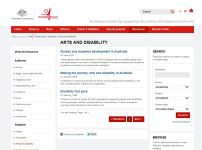 "Australia Council - Making the Journey: Arts and Disability in Australia" Reads, in part "A collection of inspiring examples of how to include people with disabilities in the arts, as participants, creators and organisers"
"Australia Council - Making the Journey: Arts and Disability in Australia" Reads, in part "A collection of inspiring examples of how to include people with disabilities in the arts, as participants, creators and organisers" -
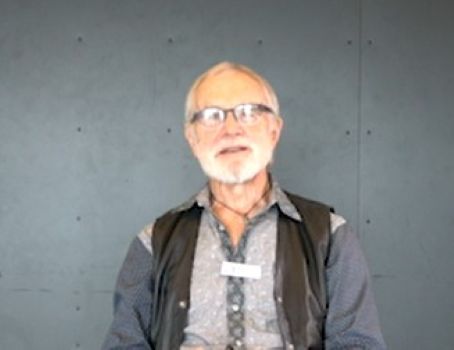 "Interview with Peter Vance" Peter Vance is a singer, songwriter, musician, performer, facilitator and disability arts advocate. Interview Summary: Peter Vance is a songwriter, performer, musician and singer. Peter suggested disability arts in the last 20 years has become more visible and popular reflecting a positive shift in how society views disability as part of the rich tapestry of human experience. This is reflected in how the arts now tell the stories of individuals with disabilities, not simply as artists with a disability, but as whole people whose varied experiences - visible and invisible - inform and enrich their creative expression. However, there are still challenges with funding and accessibility and ongoing struggles for recognition and support of disability art. Changes in how organisations operate to suit new funding such as the NDIS have potentially limited the spontaneity and personal touch that smaller, community-driven organizations once offered. Peter said it is essential to continue to push for better understanding, support, and visibility for people with all kinds of disabilities in every aspect of life, including the arts, to truly embrace inclusivity.
"Interview with Peter Vance" Peter Vance is a singer, songwriter, musician, performer, facilitator and disability arts advocate. Interview Summary: Peter Vance is a songwriter, performer, musician and singer. Peter suggested disability arts in the last 20 years has become more visible and popular reflecting a positive shift in how society views disability as part of the rich tapestry of human experience. This is reflected in how the arts now tell the stories of individuals with disabilities, not simply as artists with a disability, but as whole people whose varied experiences - visible and invisible - inform and enrich their creative expression. However, there are still challenges with funding and accessibility and ongoing struggles for recognition and support of disability art. Changes in how organisations operate to suit new funding such as the NDIS have potentially limited the spontaneity and personal touch that smaller, community-driven organizations once offered. Peter said it is essential to continue to push for better understanding, support, and visibility for people with all kinds of disabilities in every aspect of life, including the arts, to truly embrace inclusivity. -
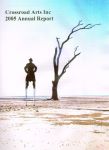 "Crossroad Arts Annual Report 2005" Crossroad Arts Annual Report 2005 - Artistic Director/CEO Report, history, including project history, major outcomes of the year including new works, touring, conferences, mentorships
"Crossroad Arts Annual Report 2005" Crossroad Arts Annual Report 2005 - Artistic Director/CEO Report, history, including project history, major outcomes of the year including new works, touring, conferences, mentorships -
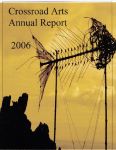 "Crossroad Arts Annual Report 2006" Crossroad Arts Annual Report 2006 - Artistic Director/CEO Report, history, including project history, major outcomes of the year including new works, theatre in education, partnerships
"Crossroad Arts Annual Report 2006" Crossroad Arts Annual Report 2006 - Artistic Director/CEO Report, history, including project history, major outcomes of the year including new works, theatre in education, partnerships -
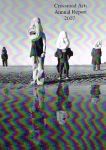 "Crossroad Arts Annual Report 2007" Crossroad Arts Annual Report 2007 - Artistic Director/CEO Report, history, including project history, major outcomes of the year including new works, creative development, reviews
"Crossroad Arts Annual Report 2007" Crossroad Arts Annual Report 2007 - Artistic Director/CEO Report, history, including project history, major outcomes of the year including new works, creative development, reviews -
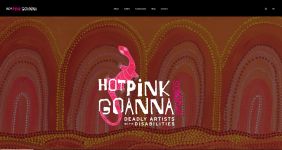 "Hot Pink Goanna Studios - Deadly With Disabilities, Website captured 2024" Hot Pink Goanna Studios: Deadly With Disabilities, website captured 2024 - with About, Gallery, Commisions, and Prints sections - reads, in part "Hot Pink Goanna was developed by Uncle Paul Constable Calcott a proud Wiradjuri man and artist living with a disability on Gubbi Gubbi Country. Hot Pink Goanna showcases the works of Uncle Paul and other First Nations artists living with a disability."
"Hot Pink Goanna Studios - Deadly With Disabilities, Website captured 2024" Hot Pink Goanna Studios: Deadly With Disabilities, website captured 2024 - with About, Gallery, Commisions, and Prints sections - reads, in part "Hot Pink Goanna was developed by Uncle Paul Constable Calcott a proud Wiradjuri man and artist living with a disability on Gubbi Gubbi Country. Hot Pink Goanna showcases the works of Uncle Paul and other First Nations artists living with a disability." -
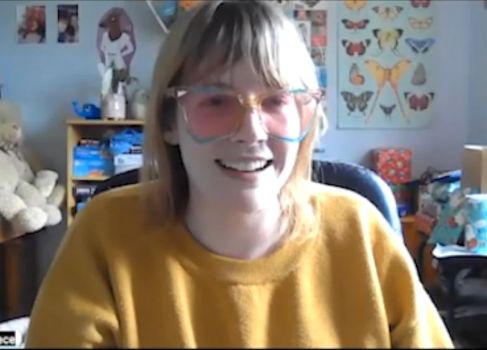 "Interview with Alex Creece" Alex Creece is writer, poet, editor, collage artist, and average kook living on Wadawurrung land. Interview Summary Alex Creece, focused on her experiences and journey as a disabled artist and writer in Australia. Alex discussed the importance of building a community and the challenges of balancing personal identity with maintaining professionalism in art. Alex expressed a desire for increased accessibility and recognition in the industry, highlighting the need for continued support of disabled artists. Throughout the conversation, the complexity of disability arts' visibility, identity politics, and the definition of creative success were explored, with Alex providing insight into her own work as well as broader industry trends and challenges.
"Interview with Alex Creece" Alex Creece is writer, poet, editor, collage artist, and average kook living on Wadawurrung land. Interview Summary Alex Creece, focused on her experiences and journey as a disabled artist and writer in Australia. Alex discussed the importance of building a community and the challenges of balancing personal identity with maintaining professionalism in art. Alex expressed a desire for increased accessibility and recognition in the industry, highlighting the need for continued support of disabled artists. Throughout the conversation, the complexity of disability arts' visibility, identity politics, and the definition of creative success were explored, with Alex providing insight into her own work as well as broader industry trends and challenges. -
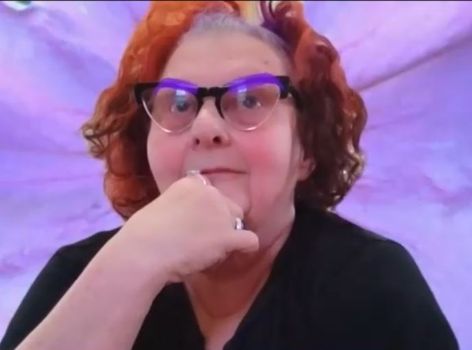 "Interview with Kath Duncan" Kath Duncan is a writer, a director, a provocateur, a visual artist, a comedian, a producer, a journalist, a radio broadcaster and disability advocate. Interview Summary Kath Duncan is an experienced and prominent figure in the disability arts community with a passion for experimental performance arts, having witnessed the beginnings of the disability arts movement in Australia and participated in its evolution. Her art is inherently political, shaped by her unique perspective as a congenital amputee. Kath firmly believes in the inherent creative revolutions and endless inspiration within all impairments. Kath highlights the ongoing struggles within the disability arts sector, including high unemployment rates for disabled individuals, systemic barriers, and the need for disabled leadership in arts organizations. While cherishing the milestones and transformative experiences she's had, Kath calls for significant systemic changes, emphasizing the importance of team playing and collective work to support and grow the disabled artist community.
"Interview with Kath Duncan" Kath Duncan is a writer, a director, a provocateur, a visual artist, a comedian, a producer, a journalist, a radio broadcaster and disability advocate. Interview Summary Kath Duncan is an experienced and prominent figure in the disability arts community with a passion for experimental performance arts, having witnessed the beginnings of the disability arts movement in Australia and participated in its evolution. Her art is inherently political, shaped by her unique perspective as a congenital amputee. Kath firmly believes in the inherent creative revolutions and endless inspiration within all impairments. Kath highlights the ongoing struggles within the disability arts sector, including high unemployment rates for disabled individuals, systemic barriers, and the need for disabled leadership in arts organizations. While cherishing the milestones and transformative experiences she's had, Kath calls for significant systemic changes, emphasizing the importance of team playing and collective work to support and grow the disabled artist community. -
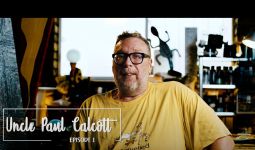 "Hot Pink Goanna Studios - Deadly With Disabilities - Walu Win Series by Uncle Paul Constable Calcott, Episode 1" Walu Win Series by Uncle Paul Constable Calcott, episode 1 - reads, in part "A mini-series exploring the benefits of art and how it is halping as a tool in the healing process. This episode is about Uncle Paul Calcott, a Wiradjuri man who is now living on Gubbi Gubbi country."
"Hot Pink Goanna Studios - Deadly With Disabilities - Walu Win Series by Uncle Paul Constable Calcott, Episode 1" Walu Win Series by Uncle Paul Constable Calcott, episode 1 - reads, in part "A mini-series exploring the benefits of art and how it is halping as a tool in the healing process. This episode is about Uncle Paul Calcott, a Wiradjuri man who is now living on Gubbi Gubbi country." -
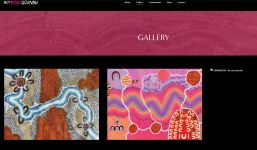 "Hot Pink Goanna Studios - Deadly With Disabilities, Gallery captured 2024" Hot Pink Goanna Studios: Deadly With Disabilities, Gallery captured 2024 - featuring imagews of works by Paul Constable Calcott
"Hot Pink Goanna Studios - Deadly With Disabilities, Gallery captured 2024" Hot Pink Goanna Studios: Deadly With Disabilities, Gallery captured 2024 - featuring imagews of works by Paul Constable Calcott -
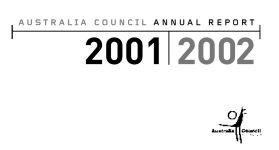 "Australia Council - Annual Report 2001-02" Australia Council Annual Report 2001-2002 - discusses letter from chair of council, corporate overview, year in review, financial statements, analysis of funding and grants for projects, initiatives, new work, programs, presentation and promotions including funding for implementing the Commonwealth Disability Strategy by evaluating current and changing needs of people with disabilities in the arts sector and reflecting this in funding and policies, arts marketing and audience development and triennial grants to disability arts organisations in NSW, South Australia and Victoria as well as an image from Crossroad Arts for the exhibition “Shades of White” and the publication “Making the Journey”
"Australia Council - Annual Report 2001-02" Australia Council Annual Report 2001-2002 - discusses letter from chair of council, corporate overview, year in review, financial statements, analysis of funding and grants for projects, initiatives, new work, programs, presentation and promotions including funding for implementing the Commonwealth Disability Strategy by evaluating current and changing needs of people with disabilities in the arts sector and reflecting this in funding and policies, arts marketing and audience development and triennial grants to disability arts organisations in NSW, South Australia and Victoria as well as an image from Crossroad Arts for the exhibition “Shades of White” and the publication “Making the Journey” -
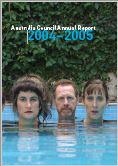 "Australia Council - Annual Report 2004-05" Australia Council Annual Report 2004-2005 - discusses letter from chair of council, letter from CEO, corporate overview, year in review, goals, financial statements, analysis of funding analysis and grants list, including funding for key organisations, new work, presentation and promotion, audience participation (with publication “Access All Areas”), skills and arts development with Arts Access partnering with Helicon Dance to provide 10 workshops in Princess Alexandra hospital Mental Health Service to find out which arts the community members wanted to pursue with a reference group including the University of Queensland and funding for Back to Back theatre to perform Small Metal Objects, in collaboration with sound artist Hugh Covill, animator Rhian Hinkley, director/designer Bruce Gladwin to shed light on, provoke and transform society, and to position artistic creativity as an integral part of the nation’s agenda. Triennial funding to Arts Access Australia (formerly known as Disability in the Arts Disadvantage in the Arts Australia—DADAA)
"Australia Council - Annual Report 2004-05" Australia Council Annual Report 2004-2005 - discusses letter from chair of council, letter from CEO, corporate overview, year in review, goals, financial statements, analysis of funding analysis and grants list, including funding for key organisations, new work, presentation and promotion, audience participation (with publication “Access All Areas”), skills and arts development with Arts Access partnering with Helicon Dance to provide 10 workshops in Princess Alexandra hospital Mental Health Service to find out which arts the community members wanted to pursue with a reference group including the University of Queensland and funding for Back to Back theatre to perform Small Metal Objects, in collaboration with sound artist Hugh Covill, animator Rhian Hinkley, director/designer Bruce Gladwin to shed light on, provoke and transform society, and to position artistic creativity as an integral part of the nation’s agenda. Triennial funding to Arts Access Australia (formerly known as Disability in the Arts Disadvantage in the Arts Australia—DADAA) -
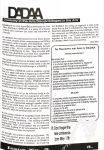 "Accessible Arts - ACE Arts Creativity Expression - Dave King - Article: DADAA - Disability in the Arts/Disadvantage in the Arts- Iss5, Pg3" Accessible Arts - ACE Arts Creativity Expression - Dave King - Article: DADAA - Disability in the Arts/Disadvantage in the Arts- Iss5, Pg3reads, in part "DISABILITY IN THE ARTS/DISADVANTAGED IN THE ARTS AUSTRALIA (DADAA) is a group of artists/art workers who represent the states and territories of Australia. Its members are representatives from those groups who work towards artistic empowerment and filling the creative needs of people with disabilities - that is to name a few, ACCESSIBLE ARTS and ARTS ACCESS. All the current members attended a meeting in July. They all work with people with disabilities and three have disabilities. The inaugural meeting was held in late 1990. This group was formed to facilitate and maintain a responsive external overview of the trends in the arts for those experiencing disadvantage or a disability."
"Accessible Arts - ACE Arts Creativity Expression - Dave King - Article: DADAA - Disability in the Arts/Disadvantage in the Arts- Iss5, Pg3" Accessible Arts - ACE Arts Creativity Expression - Dave King - Article: DADAA - Disability in the Arts/Disadvantage in the Arts- Iss5, Pg3reads, in part "DISABILITY IN THE ARTS/DISADVANTAGED IN THE ARTS AUSTRALIA (DADAA) is a group of artists/art workers who represent the states and territories of Australia. Its members are representatives from those groups who work towards artistic empowerment and filling the creative needs of people with disabilities - that is to name a few, ACCESSIBLE ARTS and ARTS ACCESS. All the current members attended a meeting in July. They all work with people with disabilities and three have disabilities. The inaugural meeting was held in late 1990. This group was formed to facilitate and maintain a responsive external overview of the trends in the arts for those experiencing disadvantage or a disability." -
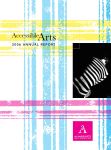 "Accessible Arts - Annual Report 2006" Accessible Arts - Annual Report 2006 - About Accessible Arts, Chair’s report, Chief Executive Officer’s report, Accessible Arts’ people, Strategic Outcomes, Service, Arts programs, Training, Audience Development, Information and Public Relations
"Accessible Arts - Annual Report 2006" Accessible Arts - Annual Report 2006 - About Accessible Arts, Chair’s report, Chief Executive Officer’s report, Accessible Arts’ people, Strategic Outcomes, Service, Arts programs, Training, Audience Development, Information and Public Relations -
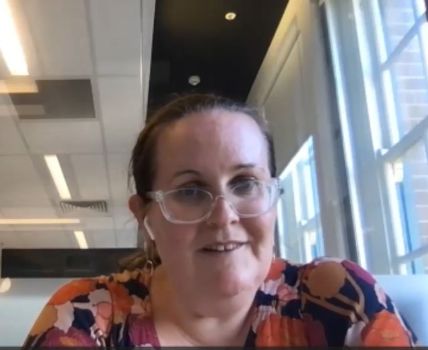 "Interview with Morwenna Collett" Morwenna is a leader, consultant and facilitator in the arts, government, not-for-profit and university sectors and is passionate about helping arts and cultural organisations to include everyone in their work. Interview Summary Morwenna Collett is a consultant in diversity, access and inclusion and during the interview discusses her vast experience in the disability arts sector including time in the Australia Council where she played a key role in creating the first targeted funding program for artists with disabilities. Morwenna notes that while disability arts is gaining some awareness with mainstream audiences, there are still issues regarding how people think about the quality of art created by artists with disabilities. Morwenna highlights the NDIS as a significant milestone for disability arts in Australia, though she believes that there is much more potential for arts organizations to engage with it. Morwenna also emphasizes that the decision for artists to identify with their disability is a personal choice and it is becoming increasingly safe to disclose this identity, demonstrating progress toward inclusion in the arts.
"Interview with Morwenna Collett" Morwenna is a leader, consultant and facilitator in the arts, government, not-for-profit and university sectors and is passionate about helping arts and cultural organisations to include everyone in their work. Interview Summary Morwenna Collett is a consultant in diversity, access and inclusion and during the interview discusses her vast experience in the disability arts sector including time in the Australia Council where she played a key role in creating the first targeted funding program for artists with disabilities. Morwenna notes that while disability arts is gaining some awareness with mainstream audiences, there are still issues regarding how people think about the quality of art created by artists with disabilities. Morwenna highlights the NDIS as a significant milestone for disability arts in Australia, though she believes that there is much more potential for arts organizations to engage with it. Morwenna also emphasizes that the decision for artists to identify with their disability is a personal choice and it is becoming increasingly safe to disclose this identity, demonstrating progress toward inclusion in the arts. -
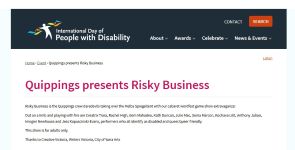 "Quippings presents Risky Business" Reads, in part "Risky Business is the Quippings crew daredevils taking over the Melba Spiegeltent with our cabaret wordfest game show extravaganza!"
"Quippings presents Risky Business" Reads, in part "Risky Business is the Quippings crew daredevils taking over the Melba Spiegeltent with our cabaret wordfest game show extravaganza!" -
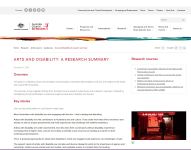 "Arts and Disability: A research summary" Australia Council - Arts and Disability: A research summary, 2018 - reads, in part "The great art created by artists with disability, and participation of people with disability in the arts, are integral to the artistic and cultural life of Australia. This summary brings together findings from Australia Council research publications and a research overview compiled by the Meeting of Cultural Ministers to build the evidence base about disability and the arts."
"Arts and Disability: A research summary" Australia Council - Arts and Disability: A research summary, 2018 - reads, in part "The great art created by artists with disability, and participation of people with disability in the arts, are integral to the artistic and cultural life of Australia. This summary brings together findings from Australia Council research publications and a research overview compiled by the Meeting of Cultural Ministers to build the evidence base about disability and the arts." -
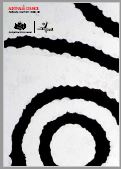 "Australia Council - Annual Report 2005-06" Australia Council Annual Report 2005-2006 - discusses letter from chair of council, letter from CEO, corporate overview, year in review, goals, financial statements, analysis of funding analysis and grants list, including various artistic and community projects - “Stickybricks” – exploring the history of a Sydney Housing Estate where 95% of residents receive aged or disability benefits were traumatised by by murders, suicides, assaults and drug and alcohol-related crimes and they partnered with Big hART to tell their story at the Sydney Festival, “Small Metal Objects” by Back to Back Theatre presented at the Melbourne international arts festival, and the DADAA (WA) regional collaborative “Bridging the Gap” project in Bunbury and publication of “Making the Journey: Arts and disability in Australia”
"Australia Council - Annual Report 2005-06" Australia Council Annual Report 2005-2006 - discusses letter from chair of council, letter from CEO, corporate overview, year in review, goals, financial statements, analysis of funding analysis and grants list, including various artistic and community projects - “Stickybricks” – exploring the history of a Sydney Housing Estate where 95% of residents receive aged or disability benefits were traumatised by by murders, suicides, assaults and drug and alcohol-related crimes and they partnered with Big hART to tell their story at the Sydney Festival, “Small Metal Objects” by Back to Back Theatre presented at the Melbourne international arts festival, and the DADAA (WA) regional collaborative “Bridging the Gap” project in Bunbury and publication of “Making the Journey: Arts and disability in Australia” -
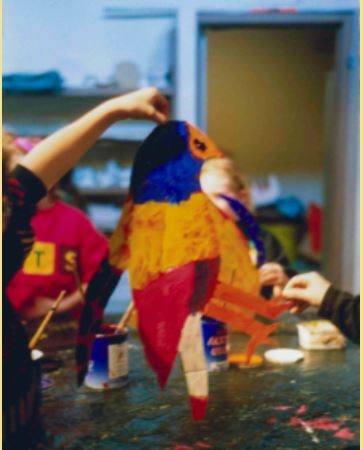 “Arts Access Victoria – Sharing knowledge (early – mid 1990s)” In 1990 AAV hosted the Participate conference. From this the DADAA (Disability in the Arts, Disadvantage in the Arts, Renamed Arts Access Australia in 2003) network was born. AAV created a guidebook on creating art projects in hospitals while programs and exhibitions “Stormy Weather”, “FEELEN BOORDUP” were gaining recognition with location and purchase of artwork.
“Arts Access Victoria – Sharing knowledge (early – mid 1990s)” In 1990 AAV hosted the Participate conference. From this the DADAA (Disability in the Arts, Disadvantage in the Arts, Renamed Arts Access Australia in 2003) network was born. AAV created a guidebook on creating art projects in hospitals while programs and exhibitions “Stormy Weather”, “FEELEN BOORDUP” were gaining recognition with location and purchase of artwork. -
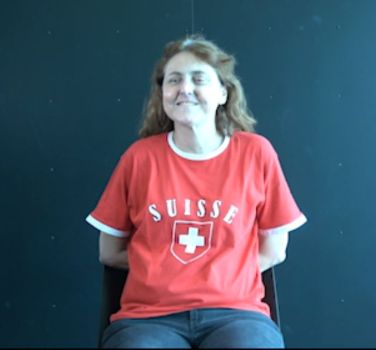 "Interview with Janelle Colquhoun" Janelle Colquhoun is an opera-jazz singer; corporate and community speaker; MC; producer; and writer. Interview Summary Janelle Colquhoun is a passionate and dedicated former opera singer, who in the interview speaks about, starting an entertainment agency to provide professional opportunities for artists with disabilities after losing her sight. She has produced over 1400 events, performed in a variety of concerts, and worked tirelessly to promote inclusivity in the arts, often by showcasing talented disabled artists to mainstream audiences. Janelle talks about how her work challenges the way people think about disability arts and inclusion, and strives to give equal performing opportunities by advocating for the recognition of artists with disabilities as professionals with the same quality of performance as any other artist.
"Interview with Janelle Colquhoun" Janelle Colquhoun is an opera-jazz singer; corporate and community speaker; MC; producer; and writer. Interview Summary Janelle Colquhoun is a passionate and dedicated former opera singer, who in the interview speaks about, starting an entertainment agency to provide professional opportunities for artists with disabilities after losing her sight. She has produced over 1400 events, performed in a variety of concerts, and worked tirelessly to promote inclusivity in the arts, often by showcasing talented disabled artists to mainstream audiences. Janelle talks about how her work challenges the way people think about disability arts and inclusion, and strives to give equal performing opportunities by advocating for the recognition of artists with disabilities as professionals with the same quality of performance as any other artist. -
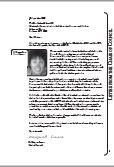 "Australia Council - Annual Report 1997-98" Australia Council Annual Report 1997-98 - discusses letter from chair of council, functions, profile, organisation chart, corporate overview, year in review, arts funding, main activities of Council and its Boards, and includes professional development activities, financial statements and lists of grants made including grants for programs, projects, information and advocacy with producing a set of Disability Fact Packs exploring the importance of accessibility for arts and cultural organisations and a guide to marketing arts to disabled audience
"Australia Council - Annual Report 1997-98" Australia Council Annual Report 1997-98 - discusses letter from chair of council, functions, profile, organisation chart, corporate overview, year in review, arts funding, main activities of Council and its Boards, and includes professional development activities, financial statements and lists of grants made including grants for programs, projects, information and advocacy with producing a set of Disability Fact Packs exploring the importance of accessibility for arts and cultural organisations and a guide to marketing arts to disabled audience -
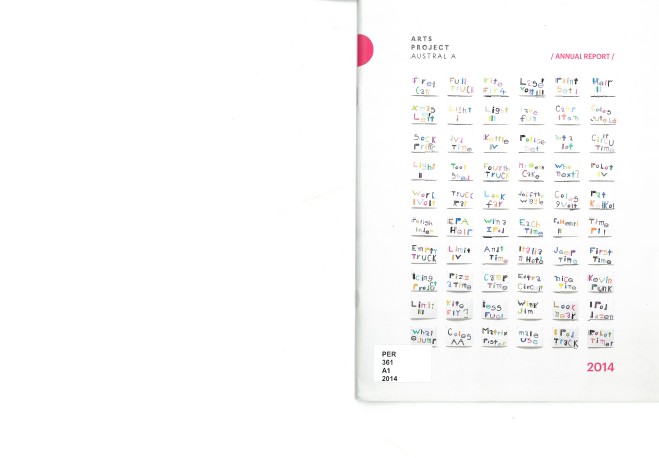 "Arts Project Australia - Annual Report 2014" Arts Project Australia - Annual Report 2014 - President's Report, Executive Director's Report, Board & Staff, Personal Perspectives, 40 Years of Highlights, Our Artists, Exhibition Report, Studio Philosophy, Financial Statements - reads, in part "OUR MANIFESTO We march to the beat of our own drum and map our own future. Fuelled by an unwavering belief in our artists, we're buoyed by the creativity and authenticity that exists in our space, and heartened by those who delight in sharing in it."
"Arts Project Australia - Annual Report 2014" Arts Project Australia - Annual Report 2014 - President's Report, Executive Director's Report, Board & Staff, Personal Perspectives, 40 Years of Highlights, Our Artists, Exhibition Report, Studio Philosophy, Financial Statements - reads, in part "OUR MANIFESTO We march to the beat of our own drum and map our own future. Fuelled by an unwavering belief in our artists, we're buoyed by the creativity and authenticity that exists in our space, and heartened by those who delight in sharing in it." -
 "NuunaRon Art Group - ‘Seven Spirits’ Artwork Story by Paul Constable-Calcott" First Peoples Disability Network NunnaRon Art Group - ‘Seven Spirits’ Artwork Story by Paul Constable-Calcott - reads, in part "The 'Culture is Inclusion' art exhibition showcases art work by the NuunaRon First Nations art group, with a lived experience of disability, telling their stories of resilience and strength through connecting to their culture"
"NuunaRon Art Group - ‘Seven Spirits’ Artwork Story by Paul Constable-Calcott" First Peoples Disability Network NunnaRon Art Group - ‘Seven Spirits’ Artwork Story by Paul Constable-Calcott - reads, in part "The 'Culture is Inclusion' art exhibition showcases art work by the NuunaRon First Nations art group, with a lived experience of disability, telling their stories of resilience and strength through connecting to their culture" -
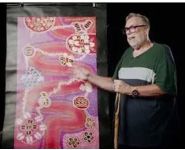 "NuunaRon - Two Spirit Yarning by Paul Constable Calcott" First Peoples Disability Network NuunaRon Art Group - 'Two Spirit Yarning' by Paul Constable Calcott
"NuunaRon - Two Spirit Yarning by Paul Constable Calcott" First Peoples Disability Network NuunaRon Art Group - 'Two Spirit Yarning' by Paul Constable Calcott -
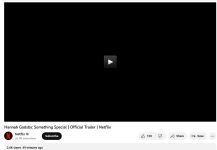 "Hannah Gadsby: Something Special | Official Trailer | Netflix" Hannah Gadsby: Something Special | Official Trailer | Netflix - Netflix.com/HannahGadsbySomethingSpecial - reads,in part "Emmy and Peabody Award winning comedian Hannah Gadsby is back for their third Netflix comedy special, Something Special, and it's a feel good show. Seriously. In this smart and dare we say...feel good set, the comedian talks about a wedding (theirs!), more than one traumatic encounter with a bunny and much more. Filmed at the Sydney Opera House, Something Special premieres globally on Netflix on May 9."
"Hannah Gadsby: Something Special | Official Trailer | Netflix" Hannah Gadsby: Something Special | Official Trailer | Netflix - Netflix.com/HannahGadsbySomethingSpecial - reads,in part "Emmy and Peabody Award winning comedian Hannah Gadsby is back for their third Netflix comedy special, Something Special, and it's a feel good show. Seriously. In this smart and dare we say...feel good set, the comedian talks about a wedding (theirs!), more than one traumatic encounter with a bunny and much more. Filmed at the Sydney Opera House, Something Special premieres globally on Netflix on May 9."
